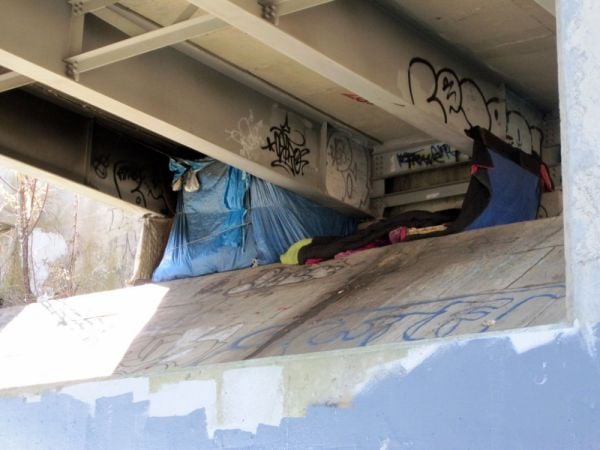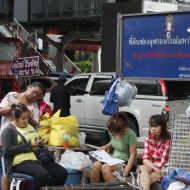How America Fails Its Informal Settlers

America’s informal settlers may not live in slums, but they face some of the same issues that those in developing countries do. Photo credit: Tony Alter
As part of the Informal City Dialogues, we’ve been looking at the issue of slum dwellers living on publicly owned land, a common phenomenon in many cities in the developing world. This practice often leads to tension between the government and informal settlers, and can result in chaotic evictions that upend the lives of these cities’ most vulnerable citizens.
But Western cities have informal settlers, too – they live in tent cities, Wal-Mart parking lots and small communities of makeshift homes along freeways, vacant lots and aqueducts. In a guest blog post, Mike Davis, author of Planet of Slums, looks at how American cities must deal with this issue as well, and decide how the poor will be allowed to use the public realm for their own survival.
For many years the City of Los Angeles has upheld the brutally schizophrenic doctrine that a person has the right to sleep on downtown sidewalks but no right to erect any type of weather shelter, however flimsy or temporary. Daily the LAPD oversees the confiscation and destruction of homeless people’s makeshift homes. In L.A., as in most large American cities, access to official shelters and SROs is strictly rationed, so single homeless adults regularly cycle from the street to a bed and back again.
Suburban communities, on the other hand, are more likely to simply outlaw sleeping in public space altogether. A famous example has been the “Peoples’ Republic of Santa Monica’s” criminalization of camping in parks and derelict spaces. The blatant purpose of such ordinances, of course, is to “dump” the local homelessness problem on a town or city further down the line — which, in turn, generates similar ordinances and exclusions throughout a region that often affect everyone, such as the curfew on Southern California beaches.
What is at stake here is not any particular interpretation of law but the very principle of the Commons itself: That is to say, the entitlement of the poorest members of a community to use public land and other resources for survival. English common law was shaped in centuries of battle between Commoners and Enclosers and continues today as a one-sided conflict with affluent homeowners and city governments on one side, and the homeless and their advocates on the other.
No one should have to sleep in a park. The right to housing was implicit in FDR’s Freedom from Want and explicit in his 1944 Economic Bill of Rights Housing all Americans was the centerpiece of Harry Truman’s Fair Deal, enshrined in the watershed Housing Act of 1949. Moreover, the right to shelter is one of the cornerstones of the Universal Declaration of Human Rights. Some of the poorest countries, indeed, acknowledge that right far better than California by at least allowing people to erect shanties and live undisturbed on vacant land.
The housing crisis in the United States is entirely a comedy of the absurd. On one hand, hundreds of edge suburbs are blighted by ghost towns of unsold or foreclosed newer homes while, on the other hand, older industrial cities are forced to destroy hundreds of thousands of units of traditional houses and apartments because they lack money for bare maintenance and repair. Meanwhile, a majority of mortgages in America have been temporarily nationalized by Fannie Mae and Freddie Mac (which, in turn, have re-nationalized themselves).
The Obama administration, in my opinion, has been disgraceful in its failure to connect these dots and advance a bold program for preventing foreclosures, saving historical housing stock and creating a non-profit rental market. We need to explode the mindset that simply accepts homelessness and mass unemployment as quasi-natural conditions. Deficit scarecrows aside, the federal government has exceptional resources for re-housing Americans and stimulating the economy by saving and rebuilding urban neighborhoods. In the meantime there should be absolute resistance to local, quasi-fascist anti-camping laws.









